Marathon Man Blu-ray Movie
HomeMarathon Man Blu-ray Movie 
Warner Bros. | 1976 | 125 min | Rated R | Sep 10, 2013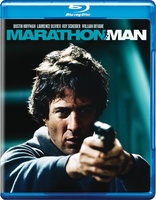
Movie rating
7.7 | / 10 |
Blu-ray rating
| Users | 4.5 | |
| Reviewer | 4.0 | |
| Overall | 4.0 |
Overview
Marathon Man (1976)
A graduate history student is unwillingly trapped in a killing game of intrigue involving a Nazi fugitive.
Starring: Dustin Hoffman, Laurence Olivier, Roy Scheider, William Devane, Marthe KellerDirector: John Schlesinger
| Psychological thriller | Uncertain |
| Drama | Uncertain |
| Thriller | Uncertain |
| Crime | Uncertain |
| Action | Uncertain |
Specifications
Video
Video codec: MPEG-4 AVC
Video resolution: 1080p
Aspect ratio: 1.78:1
Original aspect ratio: 1.85:1
Audio
English: DTS-HD Master Audio 5.1 (48kHz, 24-bit)
English: Dolby Digital 2.0 (224 kbps)
Spanish: Dolby Digital 2.0
French: Dolby Digital 2.0
2.0=mono
Subtitles
English SDH, French, Spanish
Discs
50GB Blu-ray Disc
Single disc (1 BD)
Playback
Region free
Review
Rating summary
| Movie | 4.0 | |
| Video | 4.5 | |
| Audio | 4.0 | |
| Extras | 3.0 | |
| Overall | 4.0 |
Marathon Man Blu-ray Movie Review
Safety First
Reviewed by Michael Reuben September 8, 2013Marathon Man is best known for co-star Laurence Olivier's fearsome portrayal of the former Nazi death camp commandant who tortures Dustin Hoffman's graduate student with dental tools while repeating his cryptic inquiry: "Is it safe?" But Marathon Man is more than that. In the midst of the great Seventies revolution of experimentation and independence, director John Schlesinger pulled off a traditional thriller with the gritty, streetwise look of his contemporaries and the paranoia that oozed from films like 3 Days of the Condor, The Parallax View and Taxi Driver—except that, when the lights came up after Schlesinger's film, everything felt OK. He'd smuggled in a traditional work of pure escapism disguised as an easy rider and a raging bull. The Oscar-winning director of Midnight Cowboy (1976) didn't accomplish this sleight-of-hand on his own. He had the backing of former Paramount studio head Robert Evans as his producer. (Evans, who has never been known for modesty, claims far more credit than he probably deserves in the retrospective documentary made for Paramount's 2001 DVD and included on this Blu-ray.) He had legendary screenwriter William Goldman, adapting his own novel (although the ending would be rewritten by Robert Towne, at star Dustin Hoffman's request, prompting bad blood between him and Goldman for years). And Schlesinger had an A-list cast that included Hoffman, Roy Scheider, Marthe Keller, Fritz Weaver and, above all, the aforementioned Lord Olivier, whom the studio did not think would survive the production but who in fact lived and worked for another thirteen years.
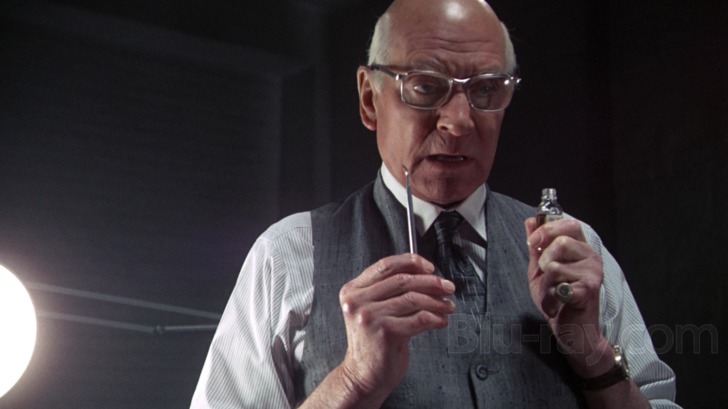
Appropriately, for a film about a Nazi fugitive, Marathon Man begins with an angry encounter between two elderly men on the streets of New York City, one Jewish and one German. The conflict escalates into a hazardous case of road rage on the narrow, mostly residential streets that ends in a deadly collision. Both men are killed. The dead German is the brother of Christian Szell, a notorious Nazi war criminal, ironically nicknamed "the White Angel" (der weisse Engel) by the concentration camp prisoners at Auschwitz for his shock of snow white hair. Now in hiding somewhere in Uruguay, Szell keeps his valuables in a safe deposit box in a Manhattan bank. He and his brother have the only keys, and Szell's brother was the first link in a chain of couriers who bring deliveries to Szell. With the brother's death, the chain is now broken. In the days that follow, many of the couriers are murdered. One of the couriers is Henry "Doc" Levy (Scheider), who also works for a covert U.S. agency called the Division, where his code name is "Scylla". Apparently the Division is keeping tabs on Szell, and Doc, a top agent, is concerned how Szell will react to his brother's death. His superior, Janeway (Devane), tells him not to worry, but it turns out that Doc's concerns are well justified. Back in New York, Doc Levy's younger brother, Thomas "Babe" Levy, leads a very different life from that of the jet-setting oilman that is Doc's cover. Babe is a graduate student in history at Columbia, where his father taught and from which he was dismissed after being hauled before Sen. Joseph McCarthy's committee hearings and accused of communist ties. Professor Levy committed suicide not long after, and each of his sons has dealt with the loss in his own way. Doc has tried to put it behind him—how successfully is unclear—while Babe refuses to let it go. McCarthyism is a major topic in his doctoral dissertation, a point that he and his advisor, Professor Bisenthal (Weaver), discuss at length. Bisenthal knew Babe's father, he tells his student. "I wept the day he died." Babe is also the "marathon man" of the title, because he's training to run long-distance races. His squalid apartment near Columbia, which he never cleans, has pictures of famous marathon champions on the walls, and he imagines them as he races around the Central Park Reservoir. But there's something desperate in Babe's stride, as if he were fleeing a demon that is always about to overtake him. Babe's training provides an extra bonus, however, when he meets a beautiful Swiss exchange student, Elsa (Keller), in the library, then steals one of her books so that he can run after her on the pretext of returning it. They begin a relationship, and Babe can't wait to introduce Elsa to Doc on his next visit to New York. However, Doc, who has grown accustomed to a deceitful life, assumes that everyone else is lying too and accuses Elsa of using his brother to gain U.S. citizenship. He is also concerned when Babe tells him that they were recently mugged in Central Park by two men in business suits. Szell, it turns out, has kept better tabs on the Division than the Division has kept on him. He may have known Doc as "Scylla", but he also knows his real identity and all about his family. Convinced that Doc has told his younger brother something crucial, the former Nazi has two lackeys kidnap the young man for interrogation—which brings us to the famous dentistry scene and Szell's question that Babe can't even comprehend: "Is it safe?" As author Goldman relates in the 2001 documentary, word quickly got out that the scene was excruciating, so that viewers would get up and leave the theater as it approached, only to return immediately afterward. Director Schlesinger had never made a thriller, and as he had in Midnight Cowboy, he pushed the boundaries of the permissible (at least for that era) to the point where preview audiences revolted against the level of violence. An eight-minute sequence featuring Roy Scheider's Scylla was cut for that reason (and apparently has not survived). Even so, the finished film contains a hotel room fight between Scylla and a would-be assassin that is memorably grim and bloody. Some films offer red herring suspects, but Marathon Man deploys multiple red herring issues that, at various times, seem to be the film's true subject: communism, anti-Semitism, the hunt for Nazi war criminals, the vindication of those wrongfully accused, the bonds between brothers. In the end, though, the film boils down to a simple confrontation between a student who wanted to be left alone to run laps and research his dissertation, and a war criminal protecting the wealth he amassed through theft and atrocity. Traditional thrillers are drawn in black and white, and one of the best sequences in Marathon Man occurs when Szell makes the mistake of visiting New York's heavily Jewish diamond district to assess the current value of his gems. He doesn't expect to be recognized, because he's shaved off his famous white locks, but several Holocaust survivors spot him anyway, and he's forced to flee. In an old-fashioned thriller, evil never manages to hide for long.
Marathon Man Blu-ray Movie, Video Quality 
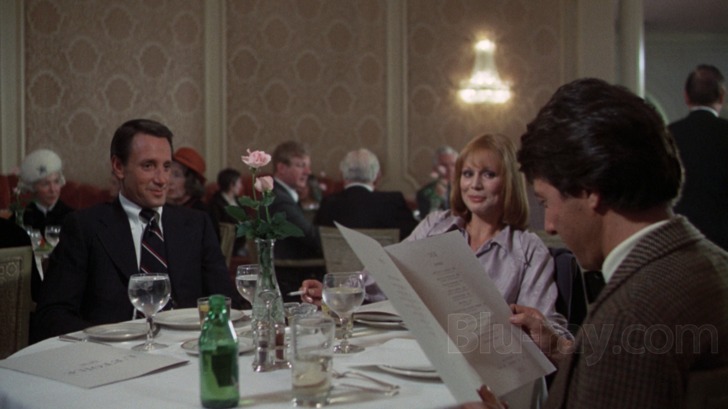
Marathon Man was shot by three-time Oscar winner Conrad Hall, who had just worked with director Schlesinger on The Day of the Locust (1975), for which his work was nominated yet again. But Hall's photography on Marathon Man looks nothing like the painterly richness for which he is best known and that created such memorable imagery for Road to Perdition, American Beauty and Butch Cassidy and the Sundance Kid (Hall's three Oscars). For Schlesinger's thriller, Hall created the kind of bleak, flat, crumbling landscape for which Sidney Lumet was noted in films of this period like Serpico and Dog Day Afternoon—and like Schlesinger himself had used in Midnight Cowboy. It's only on multiple viewings (and when you're looking for it) that you begin to notice the Conrad Hall tweaks: the carefully placed mirrors or source lights that shift the image ever so slightly to give it a more deliberate composition and bit of additional polish. It is unclear whether the transfer used on Warner's 1080p, AVC-encoded Blu-ray is the same as the one on the region-free U.K. Blu-ray released by Paramount in June earlier this year. At the very least, the U.S. and U.K. discs of Marathon Man are differently authored, with the U.K. disc containing many more language options. (Complete listings are available at the top of each disc's entry.) If one has been a fan of the film since its initial release and has seen it repeatedly through multiple video versions, as I have, it's not hard to recognize this Blu-ray from Warner/Paramount as a faithful reproduction of Conrad Hall's original photography. Detail is plentiful, and the film's natural grain has been preserved without ever becoming overemphasized, even in certain outdoor shots where the production had to rely on natural light, using the era's far less sensitive film stocks. Colors are somewhat undersaturated, and they always have been. Marathon Man's palette is meant to be weak, wan and lifeless, reflective of a society that has lost confidence in itself (which was the essence of the Seventies paranoid thriller). "They were always so confident God was on their side", Szell says contemptuously when he arrives in America. "Now I think they are not so sure." The urban decay of New York in the Seventies and the undersaturated colors convey that same message visually. The source material is in excellent shape, and no untoward digital manipulation appears to have been applied. If one looks very closely, a touch of video noise can be seen from time to time, but it's fleeting. The average bitrate of 25.95 is appropriate for a film of this vintage with a demanding natural grain structure, and I did not encounter any artifacts. Trivia note: Marathon Man was the second film to use the newly invented Steadicam, but the first one to reach theaters. The first to use the Steadicam, Bound for Glory, was released a few months later.
Marathon Man Blu-ray Movie, Audio Quality 
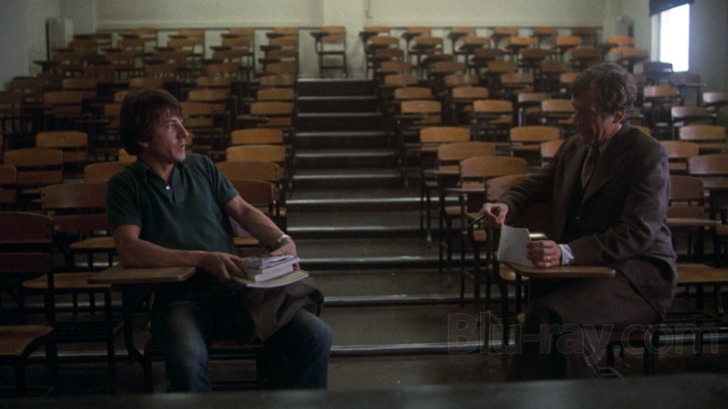
Marathon Man was originally released in mono, but Paramount remixed the sound in 5.1 for its 2001 DVD. That track is presented here in lossless DTS-HD MA 5.1. Like most of Paramount's remixes, the approach is conservative, keeping the action and dialogue in the front and using the multi-channel format primarily to benefit the atmospheric score by Michael Small, an essential composer for Seventies films (Klute, The Parallax View, The Driver, Comes a Horseman). The dynamic range is excellent, and the dialogue is always clear. Paramount's DVD also included the film's original mono track (described as "restored mono"). It was omitted from the U.K. Blu-ray, but has been included here as an option in DD 2.0.
Marathon Man Blu-ray Movie, Special Features and Extras 
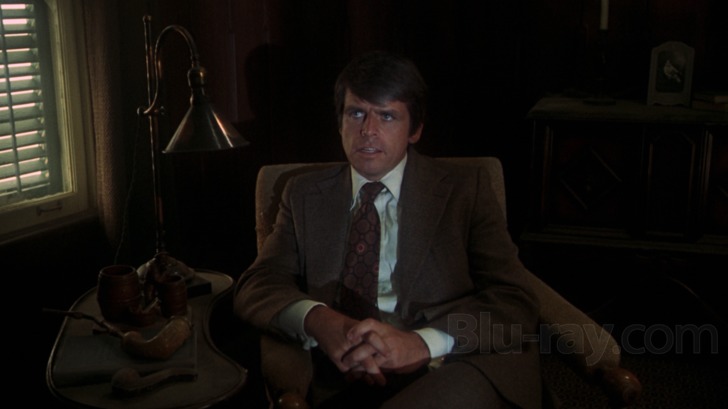
The extras have been ported over from Paramount's 2001 DVD, and their presence makes this Region A Blu-ray preferable to the featureless edition released by Paramount in the U.K.
- The Magic of Hollywood . . . Is the Magic of People (480i; 1.33:1; 21:14): On the DVD, this was listed as "Original 'Making of Marathon Man Featurette'". Producer Robert Evans dominates with his trademark promotional style, but Schlesinger gets a short time on camera (one of his few available interviews about the film), and Hoffman has even more. A highlight is the celebration of Olivier's final shooting day, complete with speeches and a toast.
- Remembering Marathon Man (480i; 1.33:1; 29:07): This retrospective documentary offers a first-rate account of the making of Marathon Man, except for the unavoidable absence of participants who have since passed away (notably, Schlesinger and Olivier). Hoffman, Scheider, Keller and Goldman all share their memories, many of which are remarkably detailed. Even the change in the ending is addressed, and twenty-five years later, Goldman seems to have resigned himself to the rewrite.
- Rehearsal Footage (480i; 1.33:1; 21:06): The rehearsal period, especially for Hoffman and Scheider, involved extensive improvisation, some of which ended up in the script. Keller joined in this process, although it was entirely new to her. Excerpts have been collected here.
- Theatrical Trailer (480i; 1.33:1; 2:51): "Is it safe?"
Marathon Man Blu-ray Movie, Overall Score and Recommendation 
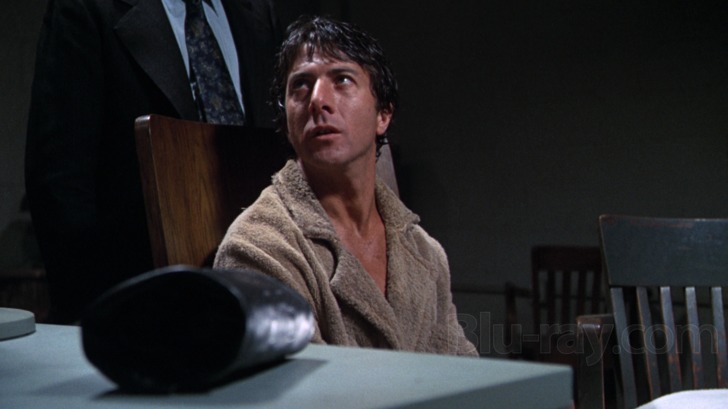
Not long after Marathon Man appeared in theaters, hilarious "gag reel" footage was shown on late night TV that I keep hoping to see as a DVD or Blu-ray extra, but Paramount may not have the rights. Dustin Hoffman has been mimicking producer Robert Evans for years, to the point where his Oscar-nominated performance in Wag the Dog was said to be an Evans caricature. On the set of Marathon Man, Hoffman not only did his Evans impression, but he also did some of Babe Levy's scenes as Evans (such as when Babe is being half drowned in his bathtub by Szell's men). He even persuaded Roy Scheider to join him in dueling Evans impressions, reading a scene between Doc and Babe. Off camera, the crew cannot stop laughing. Someone may already have uploaded these parodies to YouTube, but if not they can be found in the DVD extras on Evans' autobiographical documentary, The Kid Stays in the Picture. In the meantime, the new Paramount/Warner Blu-ray of Marathon Man is the one to get. With all due respect to the reviewer of the U.K. disc, the film is a Seventies classic and well worth your time. Highly recommended.
Similar titles
Similar titles you might also like

The Seven-Ups
Limited Edition to 3000
1973

Black Sunday
1977

Man Hunt
Limited Edition to 3000 - SOLD OUT
1941

Side Street
Warner Archive Collection
1949

Man on a String
Ten Years a Counterspy
1960

The Warriors 4K
Standard Edition
1979

Angel Has Fallen
2019

The Ipcress File
1965

Who'll Stop the Rain
1978

Jackson County Jail
1976

Red Sparrow 4K
2018

To Live and Die in L.A. 4K
1985

Sweeney!
1977

50 Dead Men Walking
Fifty Dead Men Walking
2008

The Killer Elite
Special Edition
1975

The American
2010

Patriot Games 4K
30th Anniversary Edition
1992

Klute
1971

The Crossing Guard
1995

Enemy of the State
1998

